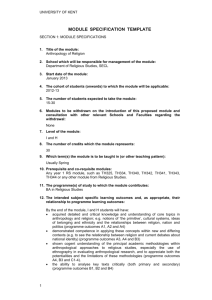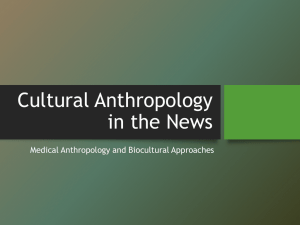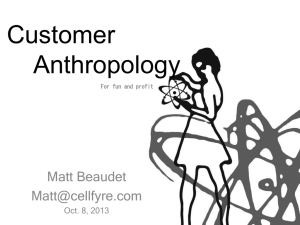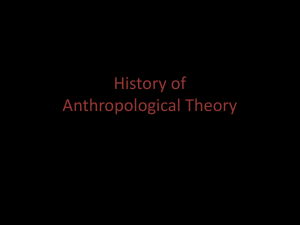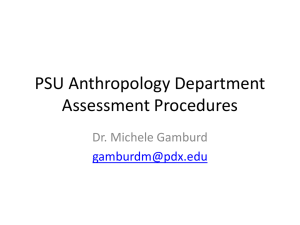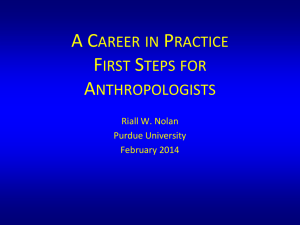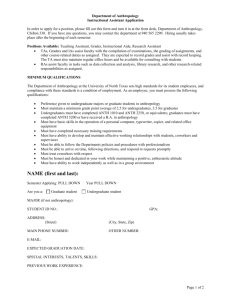UNIVERSITY OF KENT MODULE SPECIFICATION SECTION 1
advertisement
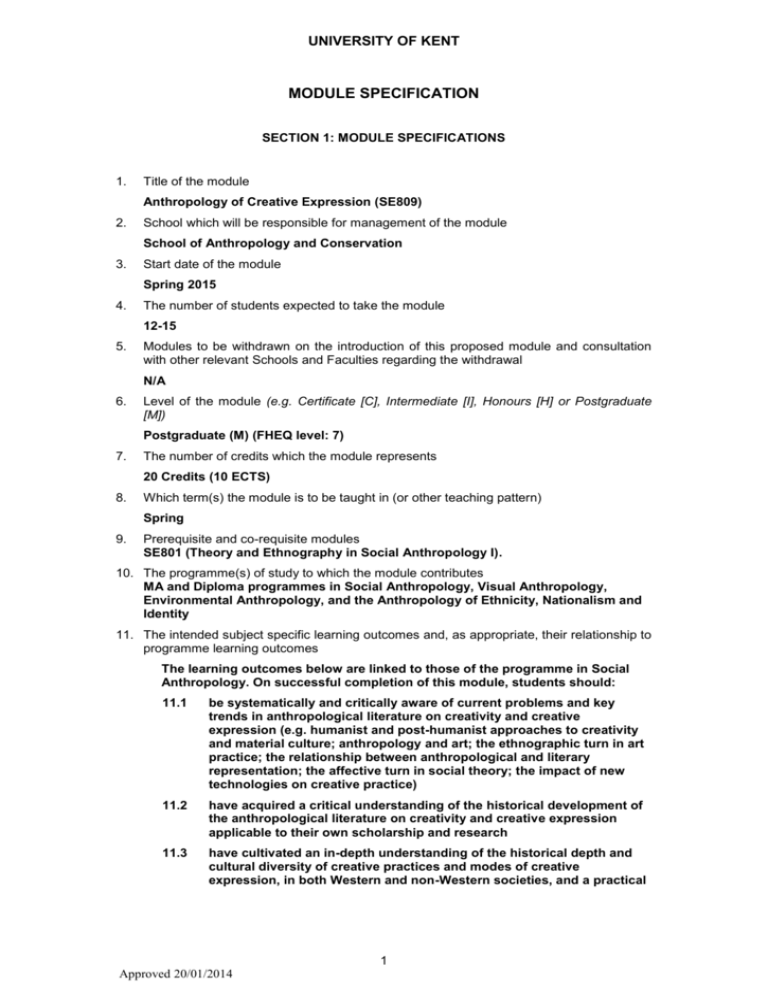
UNIVERSITY OF KENT MODULE SPECIFICATION SECTION 1: MODULE SPECIFICATIONS 1. Title of the module Anthropology of Creative Expression (SE809) 2. School which will be responsible for management of the module School of Anthropology and Conservation 3. Start date of the module Spring 2015 4. The number of students expected to take the module 12-15 5. Modules to be withdrawn on the introduction of this proposed module and consultation with other relevant Schools and Faculties regarding the withdrawal N/A 6. Level of the module (e.g. Certificate [C], Intermediate [I], Honours [H] or Postgraduate [M]) Postgraduate (M) (FHEQ level: 7) 7. The number of credits which the module represents 20 Credits (10 ECTS) 8. Which term(s) the module is to be taught in (or other teaching pattern) Spring 9. Prerequisite and co-requisite modules SE801 (Theory and Ethnography in Social Anthropology I). 10. The programme(s) of study to which the module contributes MA and Diploma programmes in Social Anthropology, Visual Anthropology, Environmental Anthropology, and the Anthropology of Ethnicity, Nationalism and Identity 11. The intended subject specific learning outcomes and, as appropriate, their relationship to programme learning outcomes The learning outcomes below are linked to those of the programme in Social Anthropology. On successful completion of this module, students should: 11.1 be systematically and critically aware of current problems and key trends in anthropological literature on creativity and creative expression (e.g. humanist and post-humanist approaches to creativity and material culture; anthropology and art; the ethnographic turn in art practice; the relationship between anthropological and literary representation; the affective turn in social theory; the impact of new technologies on creative practice) 11.2 have acquired a critical understanding of the historical development of the anthropological literature on creativity and creative expression applicable to their own scholarship and research 11.3 have cultivated an in-depth understanding of the historical depth and cultural diversity of creative practices and modes of creative expression, in both Western and non-Western societies, and a practical 1 Approved 20/01/2014 UNIVERSITY OF KENT understanding of how anthropologists, past and present, have approached their study, both theoretically and methodologically 11.4 be able to situate and analyse from an anthropological perspective the topics of creativity, creative expression and the arts in relation to relevant social, political, economic, and historical contexts; and to develop critical awareness of the strengths and limitations of this approach compared to other disciplinary perspectives on creativity 11.5 be knowledgeable about the originality and key theoretical contributions of anthropologists working on creativity, art and literature to the wider discipline of social anthropology 11.6 understand the impact of key works in the anthropology of creativity on anthropological modes of representation; and have developed a critical understanding of the practical relevance of their training to the use of anthropological methods and representational techniques 12. The intended generic learning outcomes and, as appropriate, their relationship to programme learning outcomes On completion of this module, students should gain: 12.1 Critical thinking appropriate to the postgraduate level 12.2 Ability to use (and combine effectively) written, oral and visual modes of communication 12.3 Reading, comprehension and assimilation of texts written for a professional audience 12.4 Presentation skills: clarity, professionalism, relevance of material 12.5 Ability to work effectively within a small group 13. A synopsis of the curriculum This module critically surveys anthropological approaches to creativity and creative expression—selected from research on creativity itself, and on the anthropology of art and literature (both oral and written)—and lays the foundations for students to undertake their own innovations in anthropological form. The notion of ‘creativity’ is often tied to a Western humanist model of subjectivity. In this module, we rethink creativity from a ‘post-humanist’ standpoint informed by new anthropological research, and interdisciplinary work on novelty, affect, desire, materiality, and material agency. We explore three fields of creative practice as they relate to contemporary anthropology. 1) We review classic approaches to the anthropology of art, in both non-Western and Western contexts. We assess recent breakthroughs which challenge the borders between artistic and ethnographic discourse, exploring how the ethnographic encounter can be rethought via dialogue with contemporary artists. 2) We review the anthropology of literature, and assess both pioneering forms of literary expression in the work of anthropologists, and the output of anthropological practitioners of literary fiction and poetry. 3) We examine how anthropology itself can be conceptualised as the creative expression of an encounter with others, lived experience, and the unknown, and explore the implications for anthropological modes of representation (including public anthropology). Students have the option to develop a creative project during the module that builds on this training, and can submit both academic and practice-led creative anthropological research as their assessment. 14. Indicative Reading List Archetti, E. (ed) 1993. Exploring the Written: Anthropology and the Multiplicity of Writing. Oslo: Scandinavian University Press. 2 Approved 20/01/2014 UNIVERSITY OF KENT Benson, P. 1993.(ed) Anthropology and Literature. Chicago: University of Illinois Press. De Angelis, R. (ed) 2002. Between Anthropology and Literature. London: Routledge. Gell, A. 1998. Art and Agency: An Anthropological Theory. Oxford: Clarendon Press. Hallam, E. and T. Ingold. (eds) 2008. Creativity and Cultural Improvision. Oxford: Berg. Marcus, G. And F. Myers. (eds) 1996. The Traffic in Culture: Refiguring Art and Anthropology. Berkeley: University of California Press. Morphy, H. and M. Perkins. 2005. The Anthropology of Art: A Reader. Oxford: Wiley-Blackwell. Narayan, K. 2012. Alive in the Writing: Crafting Ethnography in the Company of Chekhov. Chicago: University of Chicago Press. Schneider, A and C. Wright. 2010. Between Art and Anthropology: Contemporary Ethnographic Practice. Oxford: Berg. Schneider, A and C. Wright. 2013. Anthropology and Art Practice. London: Bloomsbury. Schwab, G. 2012. Imaginary Ethnographies: Literature, Culture, and Subjectivity. New York: Columbia University Press. Stewart, K. 2007. Ordinary Affects. Durham: Duke University Press. Svasek, M. 2007. Anthropology, Art and Cultural Production. London: Pluto Press. 15. Learning and Teaching Methods, including the nature and number of contact hours and the total study hours which will be expected of students, and how these relate to achievement of the intended learning outcomes The teaching structure of the module is 12 x 1-hour lectures + 12 x 1.5-hour seminars + 1x2 hour workshop = 32 contact hours per student. This will provide students with the opportunity to explore the module content in both intellectual and practice-led contexts, and they will have the option to develop this further in project work. Contact-based learning will be supplemented by resources collected on a Moodle site for the module. For each hour in lecture, seminar or tutorial, students will be expected to devote 4 hours of independent study or use of online module resources. They will be expected to spend 16 hours on the short essay, and 24 hours on the final project. In all, 200 hours’ study and writing will therefore be devoted to the module, including the 32 teaching contact hours. The module thus combines structured lectures, semi-structured seminars, and ample scope for individual exploration of the module’s subject matter, in both intellectual and practical contexts. This will ensure that the learning outcomes are achieved through a combination of individual student initiative, and learning material delivered by the convenor. Table of subject and generic learning outcomes supported by these methods: Teaching & Learning Method Subject Learning Outcomes Generic Learning Outcomes Lectures 11.1, 11.2, 11.3 12.1, 12.3, 12.5 Seminars 11.4, 11.5, 11.6 12.2, 12.3, 12.4, 12.5, 12.6 Workshop 11.5 12.2, 12.3, 12.4, 12.5 Online resources (Moodle) 11.1, 11.2, 11.5 12.5, 12.6 Independent study 11.1, 11.2, 11.4, 11.6 12.1, 12.2, 12.5, 12.7 3 Approved 20/01/2014 UNIVERSITY OF KENT Coursework (Short Essay, Final Project) 11.2, 11.3, 11.4, 11.6 12.1, 12.2, 12.3, 12.5, 12.6 16. Assessment methods and how these relate to testing achievement of the intended learning outcomes The module is assessed by 100% coursework. Seminar participation comprises 10% of the coursework mark; a short essay (1,500 words) comprises 30% of the coursework mark; and a final project comprises the remaining 60% of the coursework mark. For the short essay, students may work on a topic of relevance to the final project. For the final project, students can choose to submit either: 1) a 3,000 word essay drawing on library-based research developed during the module; or 2) a 1,500 word essay accompanied by a literary ethnographic text, visual anthropological text, or a combination of the two. In the case of option 2, students will be expected to develop this hybrid work via practice-led, creative anthropological research generated by seminar exercises and the workshop, and under the guidance of the module convenor. Table of subject and generic learning outcomes supported by these methods: Assessment Method Subject Learning Outcomes Generic Learning Outcomes Seminar Participation 11.4, 11.5 12.1, 12.2, 12.3, 12.4, 12.6 Short Essay 11.2, 11.3, 11.4, 11.5 12.1, 12.2, 12.3, 12.5 Final Project 11.1, 11.4, 11.5, 11.6 12.2, 12.3, 12.5, 12.7 17. Implications for learning resources, including staff, library, IT and space The only additional resources needed will be the provision of up-to date material on the region in the form of selected new books and visual materials (videos and/or dvds), for which sufficient funds are available from the School library budget. New books as required are purchased from the School library budget, and the provision of current periodicals to which the library subscribes is sufficient for needs. 18. The School recognises and has embedded the expectations of current disability equality legislation, and supports students with a declared disability or special educational need in its teaching. Within this module we will make reasonable adjustments wherever necessary, including additional or substitute materials, teaching modes or assessment methods for students who have declared and discussed their learning support needs. Arrangements for students with declared disabilities will be made on an individual basis, in consultation with the University’s disability/dyslexia support service, and specialist support will be provided where needed. 19. Campus where module will be delivered1 Canterbury If the module is part of a programme in a Partner College or Validated Institution, please complete the following: 20. Partner College/Validated Institution 21. University School (for cognate programmes) or Faculty (for non-cognate programmes) responsible for the programme 1 Required for information purposes only. Changes of campus will not require re-approval of the module specification. 4 Approved 20/01/2014 UNIVERSITY OF KENT SECTION 2: MODULE IS PART OF A PROGRAMME OF STUDY IN A UNIVERSITY SCHOOL Statement by the School Director of Graduate Studies (as appropriate): "I confirm I have been consulted on the above module proposal and have given advice on the correct procedures and required content of module proposals" Date 8 November 2013 Statement by the Head of School: "I confirm that the School has approved the introduction of the module and, where the module is proposed by School staff, will be responsible for its resourcing" Head of School Date 5 Approved 20/01/2014

